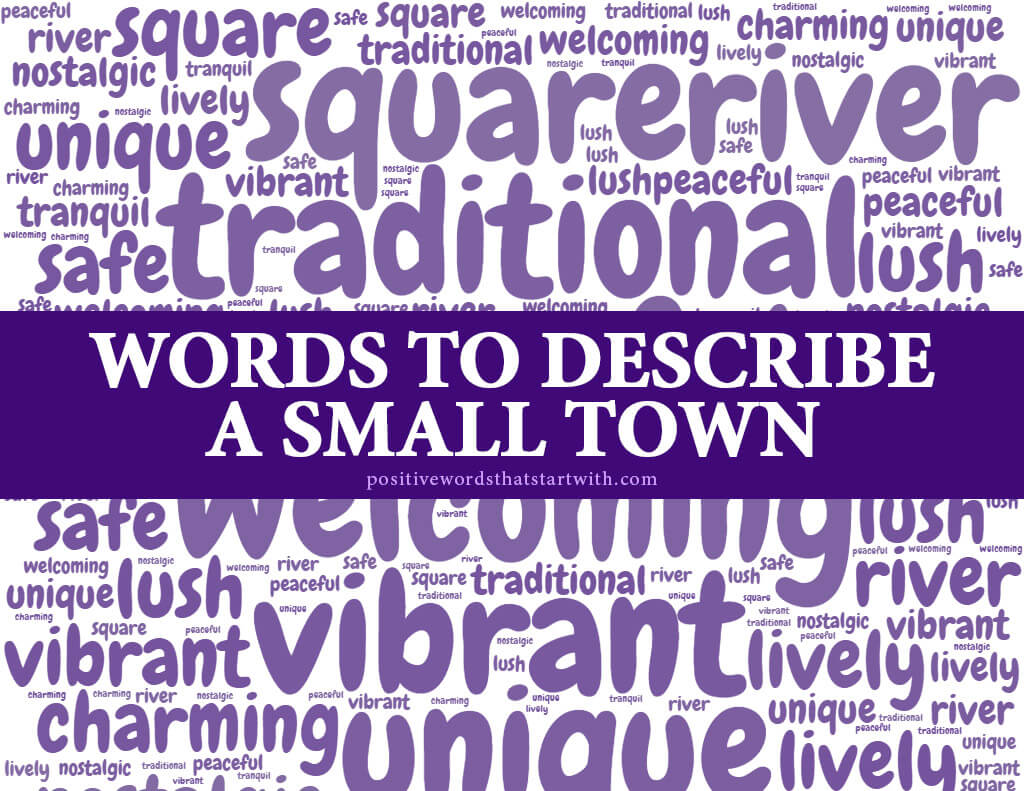
Small towns can be charming and unique in their own way. They offer a sense of community, history, and simplicity that is often lost in larger cities. When it comes to describing a small town, finding the right words, whether adjectives or nouns, can be a challenge. However, with the right adjectives and nouns, you can paint a vivid picture of the quaint and cozy atmosphere that small towns offer. From picturesque to idyllic, from friendly to welcoming, there are a plethora of words that can accurately capture the essence of a small town or even a village.
In this article, we will take a look at some of the best words to describe a small town and how to use them effectively to convey the charm and appeal of these delightful places. So, whether you’re a writer looking to create a vivid setting for your story or just someone who loves the warmth of small-town living, read on to discover the perfect words to describe a small town.
Adjectives To Describe A Small Town
Some of the best words to describe a small town include charming, picturesque, serene, cozy, nostalgic, pleasant, safe, traditional, and many more.
Quaint: Attractively old-fashioned or charming.
Charming: Delightfully attractive or pleasant.
Picturesque: Visually attractive, like a picture or painting.
Serene: Calm, peaceful, and untroubled.
Idyllic: Extremely peaceful, beautiful, or picturesque.
Tranquil: Quiet, calm, and undisturbed.
Cozy: Warm, comfortable, and inviting.
Delightful: Highly pleasing or enjoyable.
Rustic: Simple and charmingly rural in style or character.
Scenic: Having beautiful natural views or landscapes.
Quirky: Unconventional, peculiar, or eccentric in an appealing way.
Friendly: Warm, welcoming, and hospitable.
Close-knit: Having strong social bonds and a tight community.
Peaceful: Free from disturbance or conflict.
Pleasant: Giving a sense of contentment or enjoyment.
Nostalgic: Evoking feelings of longing or affection for the past.
Welcoming: Friendly and inviting to visitors or newcomers.
Safe: Secure and free from danger or harm.
Traditional: Consisting of or derived from long-established customs or practices.
Intimate: Small and private, fostering a sense of familiarity.
Quaint: Attractively old-fashioned or charming.
Authentic: Genuine, true to its origin, and not a replica.
Neat: Tidy, orderly, and well-maintained.
Historic: Having great significance or importance in history.
Lively: Full of energy, enthusiasm, or activity.
Vibrant: Full of life, color, and energy.
Welcoming: Friendly and inviting to visitors or newcomers.
Unique: One-of-a-kind, distinctive, and special.
Family-oriented: Focused on and suitable for families.
Peaceful: Free from disturbance or conflict.
Quiescent: In a state of inactivity or “doing nothing.”
Close-knit: Having strong social bonds and a tight community.
Traditional: Consisting of or derived from long-established customs or practices.
Tranquil: Quiet, calm, and undisturbed.
Lush: Green, abundant, and thriving in natural beauty.
Hometown: Relating to or characteristic of one’s birthplace or place of origin.
Hidden: Concealed or tucked away, known only to locals.
Charming: Delightfully attractive or pleasant.
Community-centered: Focused on and involved in the well-being of the community.
Romantic: Having an air of romance or a nostalgic appeal.
Nouns Related To A Small Town
Square: A public open space in the center of a town, often used for gatherings or events.
Main Street: The primary road or thoroughfare in a town where most of the businesses and shops are located.
Park: A public area of land with grass, trees, and recreational facilities for the community to enjoy.
Church: A place of worship for religious activities and gatherings.
Café: A small restaurant or coffee shop where people can gather and socialize.
Town Hall: The administrative building where local government offices and public meetings are held.
Market: A designated area or building where goods are bought and sold, often featuring local produce and crafts.
School: An institution where students receive education and instruction.
Library: A building or facility that houses a collection of books and other materials for reading, research, and learning.
Playground: An outdoor area equipped with recreational equipment for children to play and have fun.
River: A natural flowing watercourse, often a focal point of a small town’s geography and recreational activities.
Plaza: An open square or public area, usually surrounded by buildings and often featuring fountains, benches, or statues.
Bandstand: A raised platform or stage in a park or public space where bands or musicians perform.
Post Office: The central facility where mail is processed and distributed within a town.
Market: A designated area or building where goods are bought and sold, often featuring local produce and crafts.
Farm: An area of land used for agricultural purposes, often located on the outskirts of a small town.
Pond: A small body of still water, usually natural or man-made, often used for recreational activities like fishing or boating.
Museum: A building or institution that collects, preserves, and exhibits objects of cultural, historical, or artistic significance.
Community Center: A facility that serves as a gathering place for various community activities, events, and programs.
Neighborhood: A specific area or district within a town where residents live and interact with one another.
Bridge: A structure that spans across a river, road, or other obstacles, connecting different parts of a town.
Cemetery: A place where deceased individuals are buried or interred, often holding historical or cultural significance.
Factory: A building or complex where goods are manufactured or produced, contributing to the town’s economy.



